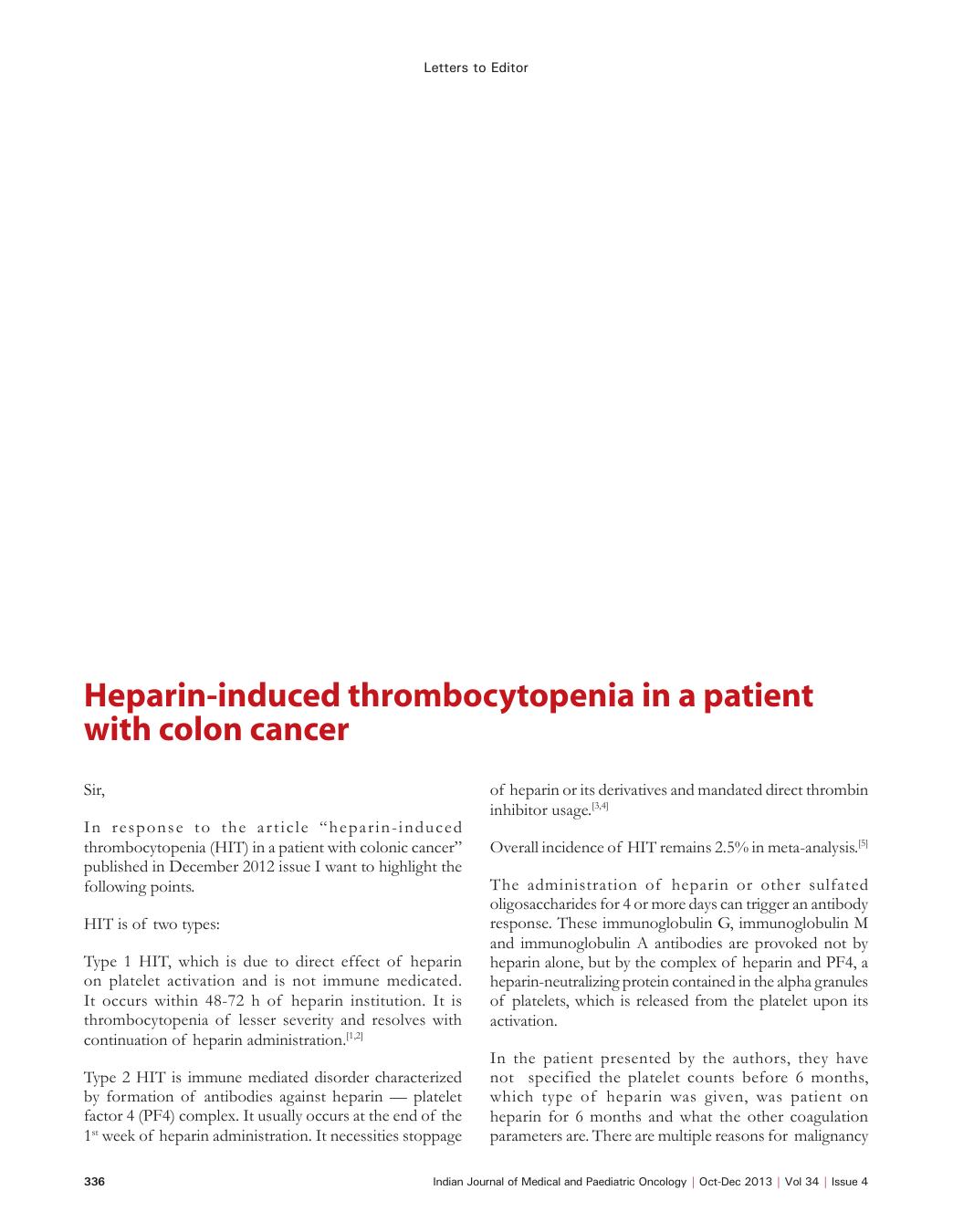Heparin-induced thrombocytopenia in a patient with colon cancer
CC BY-NC-ND 4.0 · Indian J Med Paediatr Oncol 2013; 34(04): 336-337
DOI: DOI: 10.4103/0971-5851.125267

Publication History
Article published online:
19 July 2021
© 2013. Indian Society of Medical and Paediatric Oncology. This is an open access article published by Thieme under the terms of the Creative Commons Attribution-NonDerivative-NonCommercial-License, permitting copying and reproduction so long as the original work is given appropriate credit. Contents may not be used for commercial purposes, or adapted, remixed, transformed or built upon. (https://creativecommons.org/licenses/by-nc-nd/4.0/.)
Thieme Medical and Scientific Publishers Pvt. Ltd.
A-12, 2nd Floor, Sector 2, Noida-201301 UP, India
Sir,
In response to the article “heparin-induced thrombocytopenia (HIT) in a patient with colonic cancer” published in December 2012 issue I want to highlight the following points.
HIT is of two types:
Type 1 HIT, which is due to direct effect of heparin on platelet activation and is not immune medicated. It occurs within 48-72 h of heparin institution. It is thrombocytopenia of lesser severity and resolves with continuation of heparin administration.[1,2]
Type 2 HIT is immune mediated disorder characterized by formation of antibodies against heparin — platelet factor 4 (PF4) complex. It usually occurs at the end of the 1st week of heparin administration. It necessities stoppage of heparin or its derivatives and mandated direct thrombin inhibitor usage.[3,4]
Overall incidence of HIT remains 2.5% in meta-analysis.[5]
The administration of heparin or other sulfated oligosaccharides for 4 or more days can trigger an antibody response. These immunoglobulin G, immunoglobulin M and immunoglobulin A antibodies are provoked not by heparin alone, but by the complex of heparin and PF4, a heparin-neutralizing protein contained in the alpha granules of platelets, which is released from the platelet upon its activation.
In the patient presented by the authors, they have not specified the platelet counts before 6 months, which type of heparin was given, was patient on heparin for 6 months and what the other coagulation parameters are. There are multiple reasons for malignancy patients to develop thrombocytopenia, like subclinical disseminated intravascular coagulation to paraneoplastic thrombocytopenia. There are multiple drugs, which can induce immune and non-immune thrombocytopenia including anticancer drugs. In reference patient, bone marrow, anti-nuclear antibody, urine for proteins, ultrasonography abdomen as a protocol for evaluation of thrombocytopenia was not done. The patient presented was on capecitabine, drug used in colonic cancer, which can have profound effect on platelets to cause significant thrombocytopenia.[6]
Another issue we want to address is to desist from platelet transfusion in any unexplained thrombocytopenia. It is relatively contraindicated not only in HIT, but any immune thrombocytopenia such as Idiopathic thrombocytopenic purpura or thrombotic thrombocytopenic purpura, which occur more commonly than HIT.
Lastly, if a diagnosis of HIT is made and which should be kept as a possibility in a patient on heparin, a term like unexplained thrombocytopenia should not be used.


 PDF
PDF  Views
Views  Share
Share

